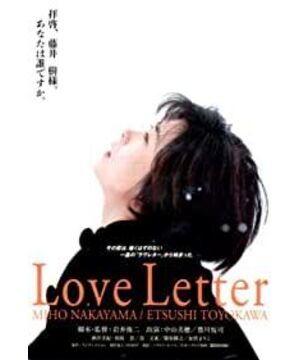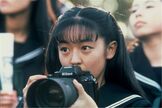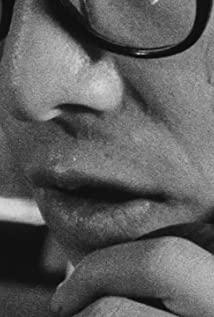Modernity and Director's Will
"Love Letter" tells a story: a fiancée, whose happiness has not yet fully begun, has been in a semi-permanent state of stagnation and mourning. The comforting farewell letter, I never imagined that after receiving the letter by accident, ripples of the past appeared in the heart that may have been quiet and ready to change, and I couldn't help but want to explore the past of my lover, and then fell into a man with the same name as my lover. The classmates with the same surname have probably experienced similar old memories as myself, and in the end, it is probably a story of lifelong regret.
From such a narrative perspective, Hiroko Watanabe, who is the "widow" fiancée, is obviously the undisputed protagonist and narrative focus. In the movie, Shunji Iwai also seems to have adopted Miho Nakayama as Hiroko and the female Fujii. This effect is enhanced by the way of tree two corners. This kind of treatment often creates a sense of confusion in the advancement of the narrative and the actors' makeup and performance, often showing the illusion that the two people's lives are intertwined and the roles are indistinguishable from each other. Looking at it from such a perspective, it can more or less point out an interesting and ponderable point of "Love Letter": a certain isomorphism of emotional mutual acceptance and complementation between Watanabe Hiroko and Mai Fujii.
This is really rare in a movie where all the characters who appear on the stage have basically dislocated emotions and are difficult to be accepted and archived as "love films". Looking back at the beginning of the whole story, it was the death of the male Fujii. This is a fact that has been confirmed but has not been seen by the audience. Its truth comes from Bozi's inability to let go, and the inescapable impulse caused the letter to be like a goodbye. The confidant class Love Letter was sent, which sparked the whole story. In this way, Iwai Shunji seems to have set an irreplaceable "first driving force" in the narrative, which promotes the beginning of the emotion, and also witnesses the end of the emotion, and finally finds the male Fujii tree / fiancé binary coexistence The truth about who the man really loves and the regret that Hiroko/Miko Fujii will miss forever.
However, compared to such a simple attribution, Zhongshan Miho, who plays two roles by one person, seems to be the absolute "a priori" premise for the establishment of the play. The old queen is exactly the same as the female Fujii tree, and it seems that Bozi is destined to inherit the feedback. The opposite of the "first driving force" in the previous article also seems to have become the basis for the narrative to be opened. The two circulate each other, naturally also It eliminates the so-called "first driving force" of narrative.
At the end of the film, when the true love letter that spanned life and death and lasted for decades was delivered to the female Fujii tree, the love that had been missed once again missed her. You might as well imagine that the boy Fujii tree is like all introverts. The little fart boy who doesn't know how to express his emotions properly misses the love of life. When he grows up, will he miss Bozi again when he is faced with the reappearance of his old lover? Judging from the result of the engagement, it is obviously no, but whether Hiroko has also experienced the same "sweet and painful" inappropriate, uncomfortable, and even confusing pursuit of secret love as the female Fujii, the answer is very likely to be definitely.
We are not yet sure whether such an imagination is correct, but in the climax of the emotional release of the film, Hiroko Watanabe, who shouted her heart in the face of the snowy mountain where her fiance was buried, and Fujii Tree, a woman who had turned the corner and was lying in a hospital bed, were cut by the old man. The double greetings of the dead soul of the day and the soul of the past opened up. Both of them appeared in the life of the male Fujii. In the time and space of different women, they formed a unity in the face of the unbearable nostalgia in the sadness. The isomorphism of the two emotional experiences of Fujii tree and female Fujii tree means that they are inside and outside each other under the narrative structure that there is no "first driving force" at all. The fact that Oujii Ki had passed away created a closed environment that hardly involved any morality. In such a closed environment, or only limited to the text world established by Shunji Iwai imitating Haruki Murakami's novels, the influence of external power and knowledge on the "three" protagonists is minimal. In fact, within the text, Mr. Akiba or Mr. Postman and others have also been emotionally lost and closed because they are outside this "three-person" system, which also makes it possible to have a true sense of self-knowledge, and only rely on self-knowledge to shape. His own self-skill has obviously formed a contradiction with the multi-faceted and three-dimensional description of the characters. The more pure it is, the more real it is. Such "imbalance" will obviously not be ignored by Shunji Iwai. The disadvantage of imbalance is that extreme inner exploration can easily lead to the idling of exploration and the failure of all promises, thus falling into necessity. The nihilism of the novel is even world-weary, but the advantage is to bring constant tension to the plot, which constantly changes the opposing but unified focus of the relationship between Hiroko and Fujiiki, and also makes it possible to have a grand, zero-focus God's point of view, thus expanding continuously. The dimension of narrative in order to achieve maximum truth-seeking.
In the story, this is also reflected in some of Iwai Shunji's more brilliant schedules. The impressive scene is the scene where Hiroko and Akiba went to Otaru City to find out the truth about Fujii Tree and were about to leave. In the voice-over, in the overall shallow focus shot, the female Fujii tree in the depth of the field is riding a bicycle and gradually drives towards the screen. The long shot is pulled over, and the focus moves from the female Fujii tree to the nearby Hiroko, and then the camera is slightly higher. The focus moved back to the female Fujii tree again, as if a person was looking at the distant self and the near self, and with the trajectory of the bicycle, the focus naturally moved to the autumn leaves, and the female Fujii tree in the shallow focus gradually came over. , and then the focus moved to the Taoist girl Fujii Tree again, and accompanied her actions back to the Hiroko who changed the focus for the first time, repeatedly verifying this kind of inspection that cannot be ignored in a complete long-lens time and space. At this time, this The long shot responded to Hiroko's sentence: "Fujii"! It came to an abrupt end.
Two people who are exactly the same face each other at this moment, and then the group performers suddenly enter the painting. Even so, in the crowd, only the two people who seem to meet each other are in the focus of the front and back fight. Miho Nakayama, who plays the two corners, deepens the self-technical texture of pure self-knowledge mentioned above.
In the film, the voice-over here is also recalled by the female Fujii tree and entered the memories of their junior high school days. The boy Fujiishu whose plot is in his memory is a boy who cannot express his feelings normally, let alone express himself, in the subjective memory of the female Fujiishu. Even his confession has to be completed with the help of extremely implicit waiting for the girl to discover herself, and eventually she misses out on her life. love.
If Shunji Iwai's "Love Letter" builds the world of self-existence technology, the male Fujii has always been constructing the subject with self-knowledge, then it can be basically judged that self-deception as a self-technology is definitely difficult to do Next, this is not only manifested in missing the love of childhood, unable to communicate with others normally, unable to return books by oneself, unable to confess, and having to go on the court to prove himself after a car accident and leg injury... It is even manifested in continuing to choose stubbornness after adulthood He continued to deceive himself, and finally died unexpectedly as arranged by the play. Correspondingly, for Bozi, who cannot continue his life without seeking the truth, and who is not honest in the face of his inability to move forward in life, such an act of sending a letter to seek comfort from the past at the beginning of the film is undoubtedly active, but this Initiative seems to be manifested only in the surface layer of self-technical practice and even realization. The hard-core dramatic moment of how to continue living after accepting the love of my life, but not actually myself, and facing a huge and inevitable setback, Iwai Shunji did not let Hiroko or Mai Fujii choose to meet. Yes, on the contrary, it is a light point. We can also glimpse this kind of non-realistic polyphony like "people don't step into the same river twice" in the story of Grandpa Fujii and Dad.
Then, this kind of positive self-existence technology may also have as unknown two sides as the overall story of the film. On the one hand, it is to reject the truth-seeking that everyone really needs above self-deception, to overcome loneliness, self-love and modern self; on the other hand, the excessive indulgence of positive self-technology is undoubtedly a kind of romanticism that can even be said to be lazy. , this brings, of course, the aestheticization of youthful cruelty and even evil, just like the overall dark tone of "Love Letter", that kind of always fresh reminiscence of the past, always inexplicably cruel and fatal texture.
View more about Love Letter reviews











